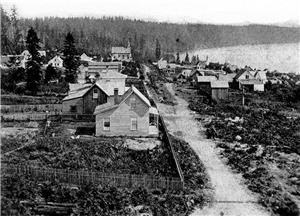By 1871, Seattle has become the distribution center of the central Puget Sound area and of the Yakima Valley located on the eastern side of the Cascade Range. It supplies goods and services from Snohomish up the Duwamish Valley and west to the lumber mills at Port Blakely, Port Madison, Port Gamble, and Port Ludlow. Seattle can boast a wide range of businesses and services: boilermakers, bakeries, gristmills, tinsmiths, cigar manufacturers, wharf builders, jewelry makers, and sash and door factories, to mention a few. King County has a total of six post offices.
Provincialism Sloughed Off
In September 1871, a traveling newspaper correspondent reports on the progress of Seattle:
“Seattle has sloughed off a great deal of its provincialism, and, more than any other place I have seen, seems to be getting ready for a metropolitan career. That is a large word, but it best expresses my meaning. Seattle merchants are reaching out in every direction to gather in and control the trade of the smaller towns and farming communities, for which that place is the central depot. The heaviest traders are Schwabacher and Co., Stone and Burnett, and Crawford and Harrington. These are first class houses, keeping large stocks, and never allowing them to get low. They supply the farmers up the Duwamish and its tributaries, the milling towns in their vicinity [including Port Blakely, Port Madison, Port Gamble, and Port Ludlow], the settlers on the Snohomish, and those on the other side of the Cascade Mountains, in the Yakima Valley. This last trade goes by wagon and pack train over the Snoqualmie Pass. The number of settlers east of the mountains increases with extraordinary rapidity, and creates a large business of which Seattle gets the cream. A thorough grade, based on a good landscape plan, would make this the most beautiful city on the Sound” (Prosch).
During 1871, there was a great deal of building activity. The Weekly Intelligencer reported in November 1871, that both the residential district and the business districts of Seattle had increased in size. Since the first of the year the residential area concentrated north of Mill Street (later renamed Yesler Way) and west of 5th Avenue, had 36 new dwellings. Besides this, many owners built additions to their residences. During the same period businessmen constructed many buildings and structures in the business district concentrated between Mill and Jackson Streets and from Elliott Bay to 2nd Street (renamed Occidental Avenue), including two wharves, three warehouses, one saloon, one bowling alley, and one machine shop.
In 1871, King County had six post offices -- Seattle, Black River (later renamed Renton), Slaughter (later renamed Auburn), White River (later moved to O’Brien), Squak (later renamed Issaquah), and Snoqualmie (later renamed North Bend). The Squak (Issaquah) and Snoqualmie (North Bend) post offices were established in 1870.
Following is a list of types of businesses and services available in Seattle at the end of 1871:
- Architect – 1
- Attorneys – 10
- Auctioneer – 1
- Bakeries – 3
- Bank – 1
- Barber Shops – 2
- Blacksmiths – 5
- Boiler Makers – 2
- Bowling Alley -- 1
- Boot & Shoe Makers – 6
- Builder – 1
- Butcher Shops – 2
- Carpenters – 10
- Coopers – 2
- Cigar Factories – 2
- Commission Merchant – 1
- Dentist – 1
- Doctors – 2
- Drug Stores – 2
- Fruit Stands – 3
- Furniture Stores – 2
- Gristmill – 1
- Grocery Store – 1
- Gunsmiths – 3
- Hotels – 3
- Insurance agents – 4
- Inspector of Steam Vessels office – 1
- Jewelry Stores – 2
- Ladies Fancy Goods Stores – 3
- Laundries – 4
- Liquor (wholesale) – 3
- Livery Stables – 2
- Machinist – 1
- Marble Shop – 1
- Milliners and Dressmakers – 6
- Oyster Houses – 2
- Photographers – 2
- Post Office – 1
- Printing Offices – 2
- Real Estate Offices – 7
- Saddle Maker – 1
- Saloons (beer) – 3
- Saloons (billiard) – 3
- Saloons (liquor) – 7
- Sash and Door Factories – 2
- Sawmill – 1
- Ship Yards – 2
- Soap Factory – 1
- Silversmith – 1
- Soda Factory – 1
- Stationers – 2
- Stove and Tinware Dealers – 2
- Surveyors – 3
- Tailors – 6
- Tannery – 1
- Telegraph Office – 1
- Tinsmith – 1
- Upholsterer – 1
- Wagon Shops – 2
- Wharf Builder – 1
- Wharves -- 6
- Wood Turner – 1

